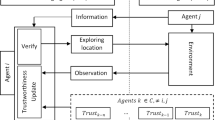Abstract
In open multiagent systems in which some of the agents may be self-interested, it is vital that an agent be able to make trust decisions about its peers to determine which of them may be untrustworthy and how to behave in response. The agent’s context, including the environment, observed and inferred actions and motives of other agents, and properties of the MAS as a whole, is critical to making an informed trust decision and especially to choosing a strategy for taking actions. However, most prior work in the area has ignored context or only treated it implicitly. In this paper, we present an implemented approach that explicitly represents the agent’s context, informed by known contexts, and that uses that contextual knowledge to select the best strategy, even in the presence of untrustworthy agents.
Access this chapter
Tax calculation will be finalised at checkout
Purchases are for personal use only
Similar content being viewed by others
Notes
- 1.
In other projects, the corresponding c-schema would automatically be retrieved from memory when no more-specialized ones were found.
- 2.
Other work in our lab looks at how to merge such conflicting contextual knowledge.
- 3.
See [19] for complete details, including the statistical analysis.
References
Bacharach, M., Gambetta, D.: Trust as type detection. In: Castelfranchi, C., Tan, Y.-H. (eds.) Trust and Deception in Virtual Societies, pp. 1–26. Springer, Netherlands (2001)
Blidberg, D.R., Chappell, S.G.: Guidance and control architecture for the EAVE vehicle. IEEE J. Oceanic Eng. (OE) 11(4), 449–461 (1986)
Castelfranchi, C., Tan, Y.: Introduction: why trust and deception are essential for virtual societies. In: Castelfranchi, C., Tan, Y. (eds.) Trust and Deception in Virtual Societies, pp. 17–31. Kluwer, Dordrecht (2001)
Cosmides, L., Tooby, J., Fiddick, L., Bryant, G.: Detecting cheaters. Trends Cogn. Sci. 9, 505–506 (2005)
Falcone, R., Castelfranchi, C.: Social trust: a cognitive approach. In: Castelfranchi, C., Tan, Y. (eds.) Trust and Deception in Virtual Societies, pp. 55–90. Kluwer Academic Publishers, Berlin (2001)
Guha, R.: Contexts: A Formalization and Some Applications. Ph.D. thesis, Stanford University, 1991. Technical report STAN-CS-91-1399-Thesis, and MCC Technical Report Number ACT-CYC-423-91 (1991)
Iszuierdo, L., Izquierdo, S.: Dynamics of the Bush-Mosteller learning algorithm in 2x2 games. In: Weber, C., Elshaw, M., Mayer, N. (eds.) Reinforcement Learning Theory and Applications, p. 424. I-Tech Education and Publishing, Vienna (2008)
Kolodner, J.L.: Retrieval and Organizational Strategies in Conceptual Memory. Lawrence Erlbaum Associates, Hillsdale (1984)
Lawton, J.H., Turner, R.M., Turner, E.H.: A unified long-term memory system. In: Branting, L.K., Bergmann, R., Althoff, K.-D. (eds.) ICCBR 1999. LNCS (LNAI), vol. 1650, p. 188. Springer, Heidelberg (1999)
Mao, W.: Modeling social causality and social judgment in multi-agent interactions. Ph.D. thesis, University of Southern California (2006)
Miller, R.A., Pople, H.E., Myers, J.D.: INTERNIST-1, an experimental computer-based diagnostic consultant for general internal medicine. N. Engl. J. Med. 307, 468–476 (1982)
Mui, L., Mohtashemi, M., Halberstadt, A.: Notions of reputation in multi-agents systems: a review. In: Proceedings of the First International Joint Conference on Autonomous Agents and Multiagent Systems: Part 1. pp. 280–287. AAMAS 2002, ACM, New York (2002). http://doi.acm.org/10.1145/544741.544807
Riley, G.: CLIPS - a tool for building expert systems. On the World Wide Web at http://www.ghg.net/clips/CLIPS.html (Accessed 16 Dec 2004)
Sabater, J., Sierra, C.: Review on computational trust and reputation models. Artif. Intell. Rev. 24(1), 33–60 (2005)
Santos, Jr., E., Johnson, Jr., G.: Toward detecting deception in intelligent systems. In: Defense and Security, pp. 130–141. International Society for Optics and Photonics (2004)
Shortliffe, E.H.: Computer-Based Medical Consultations: MYCIN. Elsevier, New York (1976)
Turner, R.M.: Context-mediated behavior. In: Brézillon, P., Gonzalez, A. (eds.) Context in Computing: A Cross-Disciplinary Approach for Modeling the Real World Through Contextual Reasoning, pp. 523–540. Springer, New York (2014)
Turner, R., Whitsel, L.: A context-based approach to detecting miscreant behavior and collusion in open multiagent systems. In: Kofod-Petersen, A., Beigl, M., Christiansen, H., Schmidtke, H.R., Coventry, K.R., Roth-Berghofer, T.R. (eds.) CONTEXT 2011. LNCS, vol. 6967, pp. 300–306. Springer, Heidelberg (2011)
Whitsel, L.T.: A context-based approach to detecting miscreant agent behavior in open multagent systems. Ph.D. thesis, School of Computing and Information Science, University of Maine, University of Maine, Orono, ME 04469 USA, December 2013
Author information
Authors and Affiliations
Corresponding author
Editor information
Editors and Affiliations
Rights and permissions
Copyright information
© 2015 Springer International Publishing Switzerland
About this paper
Cite this paper
Whitsel, L., Turner, R.M. (2015). Using Contextual Knowledge for Trust Strategy Selection. In: Christiansen, H., Stojanovic, I., Papadopoulos, G. (eds) Modeling and Using Context. CONTEXT 2015. Lecture Notes in Computer Science(), vol 9405. Springer, Cham. https://doi.org/10.1007/978-3-319-25591-0_20
Download citation
DOI: https://doi.org/10.1007/978-3-319-25591-0_20
Published:
Publisher Name: Springer, Cham
Print ISBN: 978-3-319-25590-3
Online ISBN: 978-3-319-25591-0
eBook Packages: Computer ScienceComputer Science (R0)




